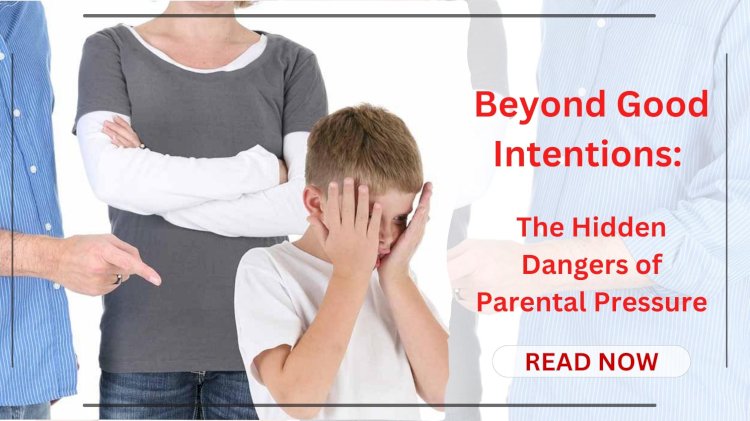Beyond Good Intentions: The Hidden Dangers of Parental Pressure
Parental pressure, born from good intentions, can lead to severe consequences such as mental health struggles, strained relationships, and personal burnout. To prevent this issue, parents should set realistic expectations and value effort over outcomes. Coping strategies include open communication, self-care, and seeking support. Recognizing parental pressure as a serious problem is vital due to its far-reaching societal and individual consequences. By fostering healthier relationships and more supportive environments, we can turn parental guidance into a source of strength rather than pressure.
By Shreya Rajvanshi Gangal

Parenting is undoubtedly one of life's most profound and challenging roles. While every parent hopes to guide their child towards success and happiness, sometimes their well-intentioned efforts can turn into something far more insidious – parental pressure. This silent adversary, fueled by love and concern, can have lasting consequences on both parents and children. In this article, we will delve into the reasons behind parental pressure, its consequences, strategies to prevent it, coping mechanisms, and why it is crucial to recognize this issue as
a serious problem.
The Origins of Parental Pressure
Parental pressure often originates from genuine love and concern for a child's future. Parents may have high expectations based on their own experiences or societal norms, believing that pushing their children to excel academically or in extracurricular activities will secure a better future. This pressure can also be driven by competition among parents, as they compare their children's achievements with their peers. Sometimes, parents may live vicariously through their children, hoping to fulfil their unmet dreams through their offspring.
Consequences of Parental Pressure
- Mental Health Struggles: One of the most devastating consequences of parental pressure is the toll it takes on a child's mental health. Anxiety, depression, and low self-esteem often stem from the constant fear of disappointing parents.
- Strained Parent-Child Relationships: Excessive pressure can lead to strained relationships, with children feeling they can never meet their parents' expectations, causing resentment and emotional distance.
- Burnout: The relentless pursuit of excellence can lead to physical and emotional burnout, affecting a child's overall well-being.
- Limited Self-Exploration: Children subjected to intense parental pressure may not have the opportunity to explore their interests and passions,
- hindering personal growth and self-discovery.
Preventing Parental Pressure
Preventing parental pressure requires open communication and empathy. Parents can:
- Set Realistic Expectations: Encourage your child to pursue their interests and passions rather than imposing your aspirations on them. Understand that every child is unique and may have different talents and desires.
- Active Listening: Be receptive to your child's feelings and concerns. Create a safe space for them to express their thoughts without judgment.
- Value Effort Over Outcomes: Emphasize the importance of hard work, perseverance, and learning from failures, rather than just focusing on
- achievements.
Coping with Parental Pressure
For children dealing with parental pressure, here are some coping strategies:
- Communication: Talk to your parents about how you feel. Honest conversations can help them understand your perspective.
- Self-Care: Prioritize self-care activities like meditation, exercise, or pursuing hobbies that bring you joy.
- Seek Support: Don't hesitate to seek support from teachers, counsellors, or
- friends who can offer guidance and understanding.
Acknowledging Parental Pressure as a Serious Problem
Acknowledging parental pressure as a serious issue is crucial for several reasons:
- Mental Health Impact: Parental pressure can have long-lasting negative effects on a child's mental health, leading to issues like anxiety and depression.
- Stunted Personal Growth: Children subjected to excessive pressure may not develop essential life skills or the ability to make independent decisions.
- Interference with Healthy Relationships: Pressure can interfere with the development of healthy relationships, as children may struggle to connect with others.
- Societal Consequences: A society burdened with individuals scarred by parental pressure may experience a ripple effect in terms of mental health crises, workforce productivity, and overall well-being.
Conclusion
Parental pressure, though rooted in love and concern, can have profound and lasting consequences on children's mental health and overall development. Both parents and children need to recognize this issue, communicate openly, and seek healthier ways to nurture growth and success. By setting realistic expectations, valuing effort over outcomes, and fostering a supportive environment, we can ensure that parental love and guidance remain a source of
strength rather than a source of pressure.
What's Your Reaction?



















